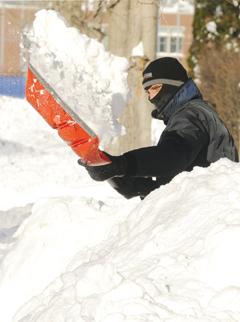 It’s snowing again in New York City. A lot more snow means a lot more problems, and I’m thankful I’m not in charge of snow ploughing. But, snow plough drivers aren’t the only ones affected by snow–employees are too.
It’s snowing again in New York City. A lot more snow means a lot more problems, and I’m thankful I’m not in charge of snow ploughing. But, snow plough drivers aren’t the only ones affected by snow–employees are too.
Should you make your employees come in to work in bad weather? Here are 5 questions to help decide:
- Can their jobs be reasonably done from home? If you have employees who largely do computer work and meet with each other, as long as they have their laptops at home, they are excellent candidates for working from home. Meetings can be held over internet and phone.
- Can “in person” work be rescheduled? It’s not practical to do some things remotely. Do you have a hard deadline that cannot, under any circumstances, be changed? If so, people better come into the office. If it’s possible to reschedule a training session, or extend a project deadline or swap some priorities around, it may be possible to have a work from home day.
- Will you have as many customers? For face to face work (restaurants, retail, fitness centers, et cetera) you can’t telecommute. Somebody has to run the cash register, manage the store, or provide personal training to the client. But, will the demand be as great on a snow day? Some companies have greater demand and some have lesser when bad weather hits. Look at your past statistics. If you predict a slow day, ask for volunteers to either work or stay home.
- Is it a hardship on employees to come in to work? People with long commutes or kids in schools that are closed may not be able to come in. If they are willing to work from home, or work on the weekend to make it up (if practical) ponder if it’s wise to require attendance. You can give people the option of taking a vacation day, a work from home day, or an unpaid leave. No sense in punishing people for things beyond their control and creating bad feelings.
- What will be the effect on morale? Morale is very important. You want happy employees. This does not mean you want employees that don’t work or that walk all over you. It means that you want employees that feel like you have empathy for them. Being hard-line may not result in better productivity in the long run.
Of course, there are some careers in which “snow days” aren’t even a possibility. Hospitals, for instance, can’t exactly say “have that heart attack or baby another day.” But, for many jobs, an occassional snow day won’t be the end of the world and may even result in a better running department in the future.
And don’t even think about spying on employees who say they are snow bound, but you suspect are skiing. You’ll be able to tell by the sunburn the next day anyway.
ATTENTION READERS
We See The World From All Sides and Want YOU To Be Fully InformedIn fact, intentional disinformation is a disgraceful scourge in media today. So to assuage any possible errant incorrect information posted herein, we strongly encourage you to seek corroboration from other non-VT sources before forming an educated opinion.
About VT - Policies & Disclosures - Comment Policy
Due to the nature of uncensored content posted by VT's fully independent international writers, VT cannot guarantee absolute validity. All content is owned by the author exclusively. Expressed opinions are NOT necessarily the views of VT, other authors, affiliates, advertisers, sponsors, partners, or technicians. Some content may be satirical in nature. All images are the full responsibility of the article author and NOT VT.



